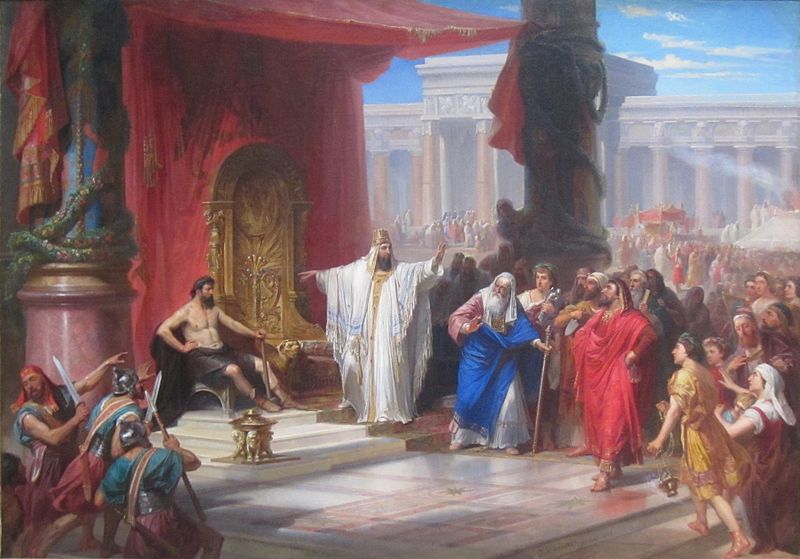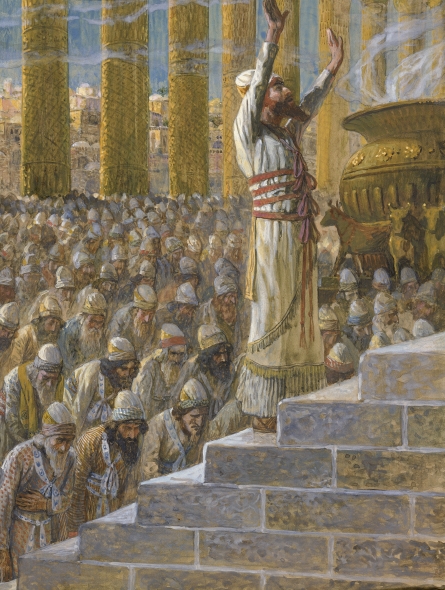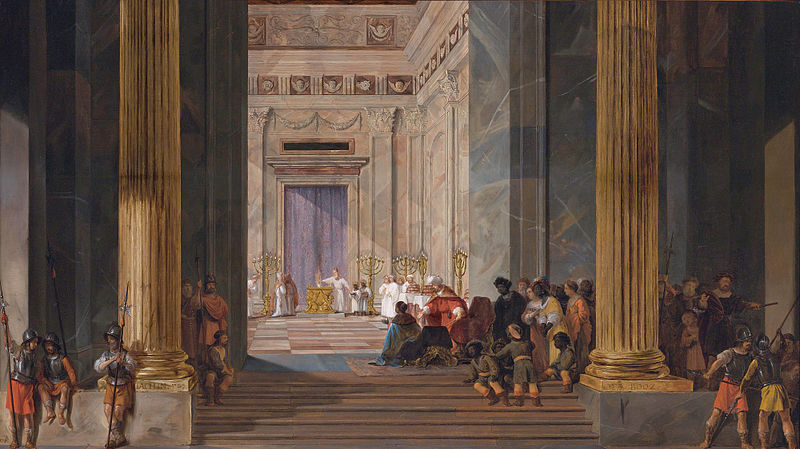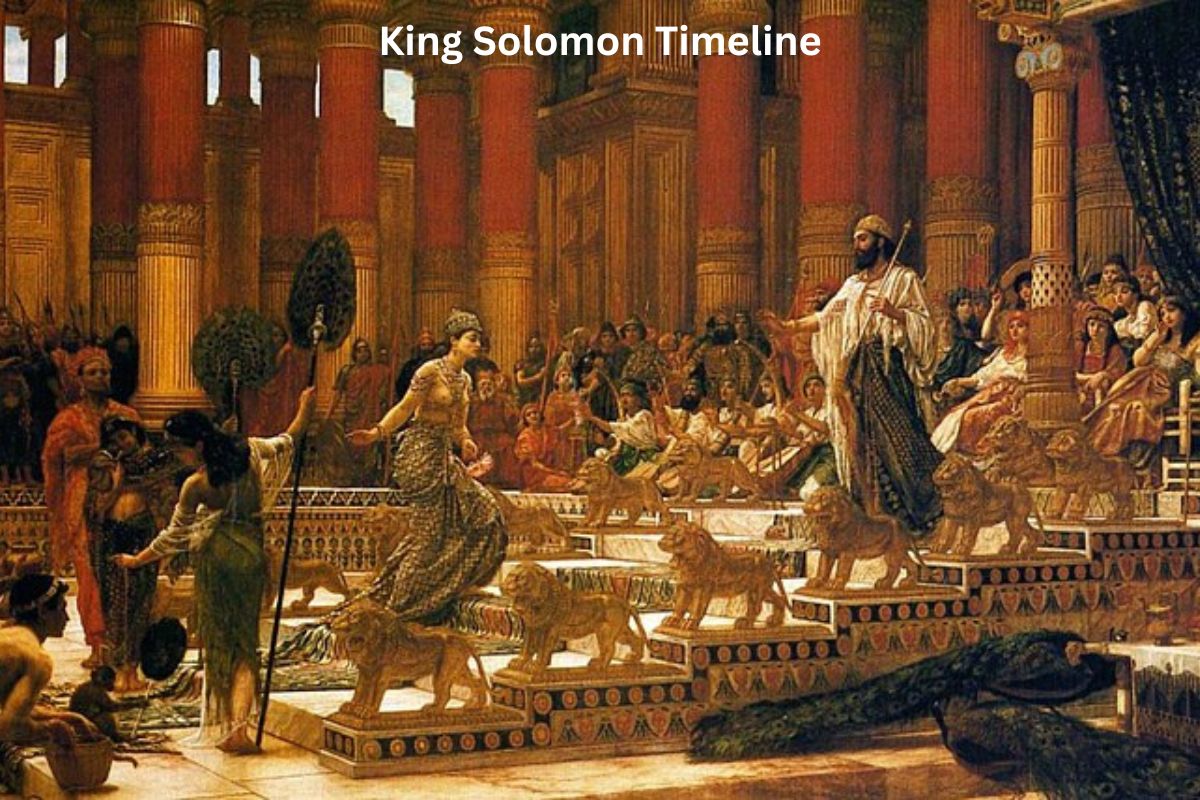King Solomon, a prominent biblical figure, is renowned for his wisdom, wealth, and contributions to the ancient Kingdom of Israel. He was born around 990 BCE and ascended to the throne around 970 BCE.
Solomon’s rule marked a period of great prosperity and cultural significance, highlighted by the construction of the First Temple in Jerusalem.
His wisdom and famous judgment in the story of the two women who claimed a child are well-known. Solomon is traditionally attributed with the authorship of biblical books like Proverbs and Ecclesiastes.
His reign ended around 931 BCE, leading to the division of the united Kingdom of Israel. Today, King Solomon’s legacy endures as a symbol of wisdom and biblical literature.
| Event | Date |
|---|---|
| Birth of King Solomon | Approximately 990 BCE |
| Accession to the Throne | Around 970 BCE |
| Construction of the First Temple Begins | Around 966 BCE |
| Wisdom and Judgment | Throughout Solomon’s Reign |
| Wealth and Prosperity | During Solomon’s Reign |
| Alliances and Marriages | Throughout Solomon’s Reign |
| Authorship of Proverbs and Ecclesiastes | Traditionally attributed to Solomon |
| Death of King Solomon | Around 931 BCE |
| Legacy | Significant figure in biblical history |
Timeline of King Solomon
1. Birth of King Solomon: Approximately 990 BCE
King Solomon, also known as Shlomo in Hebrew, was born to King David and Bathsheba. His birth took place around 990 BCE in the city of Jerusalem.
Also Read: Facts About Solomon’s Temple
His birth was significant as he was destined to succeed his father David as the ruler of Israel and became one of the most renowned figures in biblical history.

2. Accession to the Throne: Around 970 BCE
Solomon’s ascension to the throne occurred around 970 BCE following the death of his father, King David.
He was relatively young when he became king, and his rule marked the continuation of the United Kingdom of Israel, which David had established.
Solomon’s reign was characterized by his wisdom, his ambitions for the kingdom, and his contributions to the construction of the First Temple in Jerusalem.
3. Construction of the First Temple Begins: Around 966 BCE
One of King Solomon’s most significant accomplishments was the initiation of the construction of the First Temple in Jerusalem. This historic project began approximately in the fourth year of his reign, around 966 BCE, and it took seven years to complete.
Also Read: Timeline of the Kings of the Bible
The construction of the temple was a symbol of the religious and cultural significance of Jerusalem and became a central place of worship for the Israelites. The temple housed the Ark of the Covenant and played a crucial role in the religious life of the kingdom.

4. Wisdom and Judgment: Throughout Solomon’s Reign
King Solomon is perhaps best known for his exceptional wisdom and his ability to make wise and just judgments. The most famous story illustrating his wisdom is the judgment of the two women who came to him with a baby, each claiming to be the child’s mother.
Solomon proposed to split the baby in two, with each woman receiving half. The real mother immediately showed her love and concern for the child by offering to give up her claim to save the baby’s life. Solomon, recognizing the true mother’s love, awarded her full custody of the child. This story has become a symbol of Solomon’s wisdom in resolving complex disputes.
Throughout his reign, Solomon’s reputation for wisdom attracted visitors and delegations from neighboring kingdoms who sought his counsel and sought to witness his wisdom firsthand.
5. Wealth and Prosperity: During Solomon’s Reign
King Solomon’s reign was marked by a period of unprecedented wealth and prosperity for the Kingdom of Israel. This prosperity was driven by several factors, including Solomon’s abilities as a diplomat and trader.
He established trade relationships with neighboring nations, including Egypt and Tyre, which brought great wealth to his kingdom.
The vast wealth that Solomon accumulated was evident in the opulence of his court, his luxurious palaces, and the construction of the First Temple in Jerusalem. His kingdom’s affluence and influence extended beyond its borders, making Israel a significant player in the regional affairs of the time.
6. Alliances and Marriages: Throughout Solomon’s Reign
Solomon’s efforts to secure and strengthen his kingdom involved forming alliances with neighboring kingdoms through strategic marriages. He is said to have had many wives and concubines, including the famous marriage to the daughter of Pharaoh of Egypt, which sealed a significant diplomatic alliance.
While his marriages were often politically motivated, they also introduced foreign influences and religions into Israel, which would later contribute to challenges faced by the kingdom after Solomon’s death.
Some of his foreign wives worshiped other gods, which led to the construction of high places and idol worship in Israel, contrary to the monotheistic worship of Yahweh.

7. Authorship of Proverbs and Ecclesiastes: Traditionally attributed to Solomon
King Solomon is traditionally attributed with the authorship of several biblical books, two of the most well-known being the Book of Proverbs and the Book of Ecclesiastes.
- Book of Proverbs: Proverbs is a collection of wise sayings and practical advice for living a virtuous and successful life. It covers a wide range of topics, including morality, ethics, relationships, and the pursuit of wisdom. These proverbs are often characterized by their brevity and memorable style.
- Book of Ecclesiastes: Ecclesiastes is a philosophical and reflective work that explores the meaning of life, the pursuit of happiness, and the inevitability of death. It is known for its famous opening lines, “Vanity of vanities, all is vanity,” and it delves into existential questions about the human condition.
These books reflect Solomon’s reputation for wisdom and his contemplative nature. They have had a lasting impact on biblical literature and continue to be studied and referenced for their philosophical and moral insights.
8. Death of King Solomon: Around 931 BCE
King Solomon’s reign came to an end with his death, which is estimated to have occurred around 931 BCE. His death marked a turning point in the history of Israel.
After Solomon, the united Kingdom of Israel split into two separate kingdoms: the northern Kingdom of Israel, with its capital in Samaria, and the southern Kingdom of Judah, with its capital in Jerusalem. This division was a result of political and religious tensions within the kingdom.
9. Legacy: Significant figure in biblical history
King Solomon’s legacy is multifaceted and enduring. He is remembered for several key aspects:
- Wisdom: Solomon’s wisdom, as exemplified in his famous judgment of the two women and his writings in Proverbs and Ecclesiastes, continues to be celebrated as a symbol of intellectual and moral insight.
- Construction of the First Temple: The First Temple in Jerusalem, built under Solomon’s leadership, remains a significant historical and religious symbol. It was the central place of worship for the Israelites until its destruction by the Babylonians in 586 BCE.
- Cultural Influence: Solomon’s reign contributed to the cultural and economic development of Israel, leaving a mark on the region that lasted for centuries.
- Challenges: Solomon’s alliances through marriage also introduced foreign influences and religions into Israel, which eventually led to challenges and divisions within the kingdom after his death.
- Biblical Legacy: Solomon’s life and writings are featured prominently in the Hebrew Bible (Old Testament) and have left a lasting impact on biblical literature and religious thought.
King Solomon is a complex and significant figure in biblical history, known for his wisdom, wealth, and contributions to the religious and cultural heritage of Israel. His reign and legacy continue to be studied and celebrated to this day.
